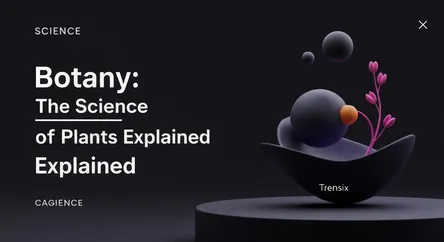Science
Botany: The Science of Plants Explained

Explore botany, the fascinating scientific study of plants. Discover its vital role in food, medicine, sustainability, and our planet's future.
What is it?
Botany, also known as plant science, is the branch of biology dedicated to the study of plant life. It's a vast field that examines the structure, growth, reproduction, metabolism, diseases, and evolution of plants, from the smallest algae to the tallest trees. Botanists seek to understand how plants function at the molecular level, how they interact within ecosystems, and how they can be classified. This foundational science also includes specialized disciplines like ethnobotany (human use of plants) and paleobotany (fossil plants), providing a complete picture of the plant kingdom's past and present.
Why is it trending?
Botany is gaining prominence as we face global challenges like climate change and food security. Scientists are racing to develop more resilient crops that can withstand drought and new diseases. There's also a renewed interest in bioprospecting—searching for new medicines and materials from plants. Furthermore, a cultural shift towards sustainability, plant-based diets, urban gardening, and using indoor plants for well-being has brought botany into the mainstream. People are increasingly recognizing that understanding plants is key to solving environmental issues and improving human health.
How does it affect people?
Botany fundamentally shapes human civilization. It is the science behind all agriculture, providing the food we eat, fibers for clothing like cotton, and wood for shelter and fuel. Many essential medicines, from aspirin (originally from willow bark) to cancer treatments, are derived from plants. Botanists are also crucial for conservation efforts, working to protect endangered plant species and restore vital ecosystems like forests and wetlands. Their work ensures the stability of our environment, the quality of our air and water, and the biodiversity that sustains all life on Earth.